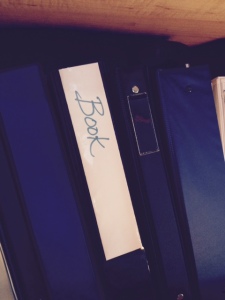(Continued from Part I, Part II and Part III) 
I will never forget the feeling that day when I collated thirty chapters, punched holes, and neatly stacked all 330 pages of my first draft into a pink, soft-cover binder. I wasn’t Rocky at the stop of the stairs with pumped fists, but rather felt a peaceful satisfaction unlike any I’d ever experienced. It was a book in my hands, and I’d written it.
At the prescribed time, I emailed a digital copy to Jim Lund, the editor who had agreed to help me. His feedback arrived about three weeks later.
Jim’s comments were mostly about structural issues. The timeline was chaotic and he had trouble following what happened when. We shuffled chapters and paragraphs, and “trimmed” unnecessary copy. For example, when describing the time Annie broke into our upstairs bedroom, I’d “squirreled” a three-page tangent about the bats that flew into our house throughout that entire summer. “Kind of interesting,” Jim said, “in a creepy sort of way. I’d trim this.” “Trim” being the kind word for “chuck it.”
Over a period of months, I integrated Jim’s recommendations into a cleaner draft. I read and re-read that manuscript dozens of times, sometimes aloud, and fine-tuned the cadence and the prose into a finished product that sounded like me. It was then ready for beta readers.
I paid Office Max $110 to print eleven copies of the manuscript. I then assembled the pages into inexpensive binders and began to share my work with friends and family. Copies went to my brother, Paul; to Annie, of course; my son, Jeff; a couple of dear friends; my pastor’s wife, Kari; plus my therapist and the four women in our long-standing support group. My husband, Pete, continued to show little interest in reading, remaining insistent that it took me 330 pages to say what he likely would have said in 11.
I can’t remember a time when I ever felt so vulnerable… and I was terrified.
It’s a huge commitment to read someone’s work, especially 330 pages of it, and comments began to trickle in over a period of weeks. “This is good, Barb. This is really, really good. I read tons of books and frankly could not put this down.”
Yeah… that’s what friends are supposed to say.
I continued to edit and trim, ultimately heeding the advice of others and slashed/reworked/condensed the first few chapters. I couldn’t read a paragraph without reworking it, and wondered if I’d ever know when the book was done.
In the meantime, I bought hundreds of dollars worth of books on self-publishing. Jim taught me that only famous people received publishing deals these days, or people who had developed strong national platforms. He thought my story was powerful, but I was unknown. Completely unfamous.
Nevertheless, after two years of hard writing, I thought it would be fun to query some agents and see how the process worked. Maybe I’d get some helpful feedback. I’d already drafted a query letter in a “How to get your book published” class up at our community college. Next I needed to write a proposal, and Jim provided some templates.
Writing the proposal was miserable. While my business background proved helpful, I found this part of the process a chore. The manuscript was written first-person past tense, yet Jim instructed me to write the proposal in third-person present tense. So each of the thirty plus chapters needed to be condensed and translated into a different form of speech. It was a grind, and I shelved the book for months. This just wasn’t going to happen.
Until… until, I felt the nudge again. “It’s time,” said the voice within my own.
Two days later I sent a query letter to two agents, and both responded within a week. Requests for the proposal followed, and the manuscript followed after that. My brain could scarcely take in the enormity of what was happening.
One of the agents was the wonderful Alice Crider and she signed me with WordServe Literary. Within a few weeks, Alice had secured two publishing offers.
The rest is history, as they say. I’m not a famous author by any means, but I am an author nonetheless. It was four years after I received that first nudge from God to “write a book about the gifts you were given,” that Zondervan released A Very Fine House: A Mother’s Story of Love, Faith and Crystal Meth. They even retained my working title.
Miracles can and do happen. First was my daughter’s return from the abyss of drug addiction. Then a book followed about the gifts, the lessons learned. Whew. Both experiences have strengthened a simple faith, and changed me forever.


 My friend also asked if there was a souvenir I might like from the Holy Land.
My friend also asked if there was a souvenir I might like from the Holy Land.




